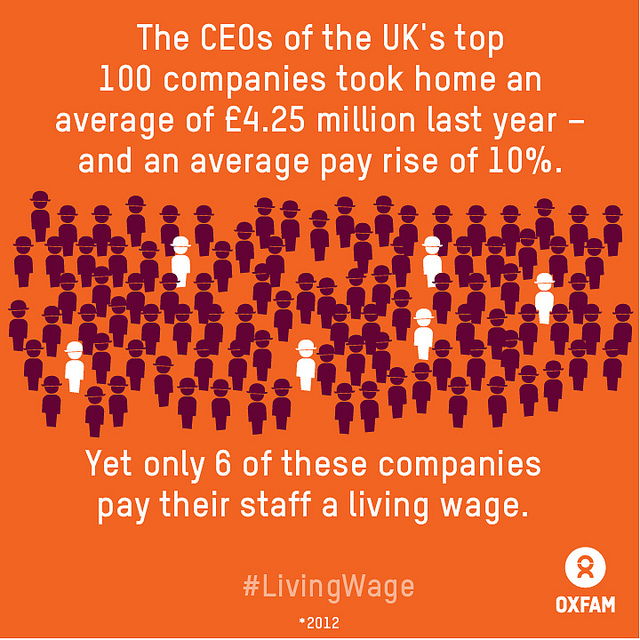Peace Hub is calling on you to take action to uncover the pay gap – the ratio between the highest paid in a company, and their median wage.
But what about those on the lowest pay: how can we make sure everyone is earning enough to live on?
The short answer is: pay a Living Wage.
The concept of a living wage is very simple – pay an hourly rate that actually leaves people with enough money to pay for basic necessities. Calculating it is not so simple! The Centre for Research in Social Policy at Loughborough University makes the calculation based on the cost of housing, food and household essentials, council tax and childcare. They calculate these living costs (using a weighted average for people in different circumstances e.g. single / in couples / with children) and work out an hourly rate of pay that should allow people to get by, after any taxes and benefits. There is a separate calculation for London, where the cost of living is higher than the rest of the UK.
Companies can then choose to pay this as a minimum hourly rate for all their employees (including outsourced employees) and so become an accredited ‘Living Wage Employer’ as, for example, Lidl has recently done. Look out for the Living Wage mark to support businesses that have chosen to do this:

To make sure that companies aren’t overwhelmed by staffing costs, the Living Wage rises slowly (at the average rate of wage increases for the UK plus 2 percentage points.) A wage that would truly cover the cost of living (outside London) is currently £9.20, but because of the ‘slow-increase’ principle, the current official Living Wage is £7.85. Hopefully, over time these figures will merge.
Didn’t the chancellor recently announce that everyone will have to pay a Living Wage?
The chancellor recently announced an increase in the legal minimum wage (currently £6.50) to £7.20 for over 25s in 2016 and to £9 by 2020. Although this increase is very welcome, it is somewhat disingenuous for the government to have called this the ‘National Living Wage’. There is no mechanism tying this higher minimum wage to the cost of living, and it does not account for taxes and benefits. This means there is no guarantee that people earning this minimum wage will have enough money to live on – so it is not a true living wage. You can read the Living Wage Foundation’s response to the budget for more detail.


